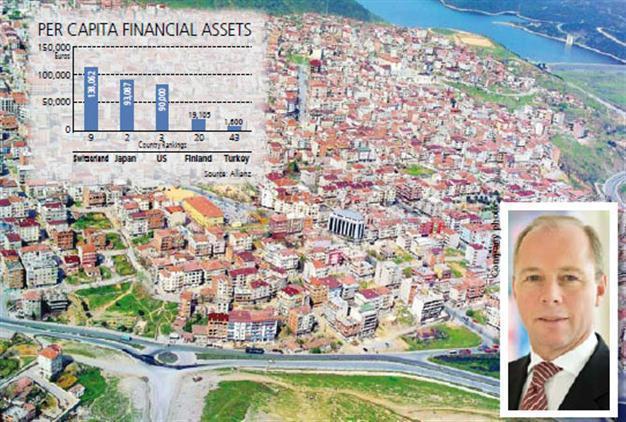Turkey lags among top 50 in per capita assets
ISTANBUL- Hürriyet Daily News

This aerial shot shows the urban sprawl in Istanbul. Turkey’s per capita financial assets are the equivalent of 1,600 euros. Hürriyet photo
Assets per capita across the world increased just 0.6 percent last year from nearly 10 percent a year earlier, according to a recently published report by Allianz, an insurance company.
Turkey registered a 2.8 percent increase last year, but the figure was not enough to pull the country out of the poor club with only 1,600 euros per person.
“Global uncertainty, low interest rates and the euro crisis have definitely left their mark on asset development,” said Michael Heise, the Allianz Group’s head economist.
Allianz’s “Global Assets Report” examined more than 50 countries, looking at their active assets and debts. According to the report, after the 2007 and 2008 economic crisis, there was a significant improvement in financial assets, but this trend stagnated last year. While in 2009 and 2010 there was a 7.8 percent and 9.7 percent respective increase in per capita net assets, there was only a 0.6 percent increase in 2011.
Although there was only a 2.8 percent increase in per capita assets in Turkey last year, the average yearly increase in per capita assets in Turkey has been roughly 9.8 percent since 2000, according to the report.
In terms of Turkey’s global ranking, the country comes in at 43rd place at 1,660 euros per person. Switzerland leads the list in first place followed by Japan and the United States.
‘Aggressive’ savingsThe report separated the countries into three categories. The wealthiest countries in the first group are comprised of 17 countries with per capita net assets totaling more than 26,800 euros. The number of medium-wealthy countries in the second group has increased two-fold in the past few years with per capita assets totaling 4,500 euros. The poor countries – the biggest group – are the last category and have per capita assets of less than 4,500 euros.
Investors have been faced with an aggressive “savings” environment, Heise said, adding that over the past 11 years, investors have not been able to increase their wealth. “This is an upsetting development.” Despite this, investors have been more disciplined about debt since the 2007 and 2008 global financial crisis. In 2011 there was a slowdown in the global debt rate, which increased just 2.2 percent, bringing the total to around 67 percent; before the crisis, global debt was approximately 72 percent and was growing by 8 percent per year, according to the report.
